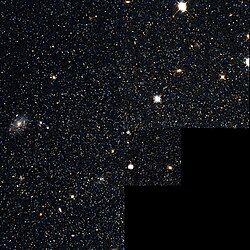アンドロメダ座I
表示
| アンドロメダ座I | ||
|---|---|---|

| ||
ハッブル宇宙望遠鏡による画像
| ||
| 星座 | アンドロメダ座 | |
| 見かけの等級 (mv) | 13.6[1] | |
| 視直径 | 2′.5 × 2′.5[1] | |
| 分類 | dSph | |
| 位置 元期:J2000.0 | ||
| 赤経 (RA, α) | 00h 45m 39.8s[1] | |
| 赤緯 (Dec, δ) | +38° 02′ 28″[1] | |
| 赤方偏移 | -368 ± 11 km/s[1] | |
| 距離 | 2.40 ± 0.08×106光年[2][3][4] | |
| 他のカタログでの名称 | ||
| And I,[2] Anon 0043+37,[1] PGC 2666[1] | ||
| ■Template (■ノート ■解説) ■Project | ||
アンドロメダ座I(Andromeda I)は、アンドロメダ座の方角に約240万光年[4]離れた位置にある矮小楕円体銀河である[5]。アンドロメダ座Iは、局所銀河群の一部で、アンドロメダ銀河の伴銀河である。アンドロメダ銀河の南約3.5°で若干東に位置し[6]、アンドロメダ銀河からの距離が15万光年以内[4][6]と推定され、2005年時点で既知の最も近い矮小楕円体銀河の伴銀河である[7]。
アンドロメダ座Iは、1970年にパロマー天文台の48インチ望遠鏡を用いてシドニー・ファン・デン・ベルフ[8]が発見した[5]。その後、ハッブル宇宙望遠鏡の広視野惑星カメラ2によって、さらに研究が行われ、他の矮小楕円体銀河のように赤色の水平分枝の恒星が大部分を占めていることが明らかとなった[9]。この事実と、青色の水平分枝星が豊富に存在すること、さらに2005年に99個のこと座RR型変光星が発見されたことから[7]、星形成期に入っていることが結論付けられた。推定年齢は約100億歳である。ハッブル宇宙望遠鏡は、アンドロメダ座I中に球状星団も発見し、中でこのような星団が発見された最も暗い銀河となった[10]。
関連項目
出典
- ^ a b c d e f g “NASA/IPAC Extragalactic Database”. Results for Andromeda I. 2008年1月21日閲覧。
- ^ a b I. D. Karachentsev, V. E. Karachentseva, W. K. Hutchmeier, D. I. Makarov (2004), “A Catalog of Neighboring Galaxies”, Astronomical Journal 127 (4): 2031–2068, Bibcode: 2004AJ....127.2031K, doi:10.1086/382905
- ^ Karachentsev, I. D.; Kashibadze, O. G. (2006), “Masses of the local group and of the M81 group estimated from distortions in the local velocity field”, Astrophysics 49 (1): 3–18, Bibcode: 2006Ap.....49....3K, doi:10.1007/s10511-006-0002-6
- ^ a b c McConnachie, A. W.; Irwin, M. J.; Ferguson, A. M. N.; Ibata, R. A.; Lewis, G. F.; Tanvir, N. (May 2004), “Determining the location of the tip of the red giant branch in old stellar populations: M33, Andromeda I and II”, Monthly Notices of the Royal Astronomical Society 350 (1): 250, arXiv:astro-ph/0401453, Bibcode: 2004MNRAS.350..243M, doi:10.1111/j.1365-2966.2004.07637.x
- ^ a b van den Bergh, Sydney (January 1972), “Search for Faint Companions to M31”, Astrophysical Journal 171: L31, Bibcode: 1972ApJ...171L..31V, doi:10.1086/180861
- ^ a b Andromeda I, Students for the Exploration and Development of Space (SEDS), (July 25, 2001)
- ^ a b Pritzl, Barton J.; Armandroff, Taft E.; Jacoby, George H.; Da Costa, G. S. (May 2005), “The Dwarf Spheroidal Companions to M31: Variable Stars in Andromeda I and Andromeda III”, The Astronomical Journal 129 (5): 2232–2256, arXiv:astro-ph/0501083, Bibcode: 2005AJ....129.2232P, doi:10.1086/428372
- ^ McConnachie, A. W.; Irwin, M. J.; Ferguson, A. M. N.; Ibata, R. A.; Lewis, G. F.; Tanvir, N. (2005), “Distances and metallicities for 17 Local Group galaxies”, Monthly Notices of the Royal Astronomical Society 356 (4): 979-997, arXiv:astro-ph/0410489, Bibcode: 2005MNRAS.356..979M, doi:10.1111/j.1365-2966.2004.08514.x.
- ^ Da Costa, G. S.; Armandroff, T. E.; Caldwell, Nelson; Seitzer, Patrick (December 1996), “The Dwarf Spheroidal Companions to M31: WFPC2 Observations of Andromeda I”, Astronomical Journal 112: 2576, arXiv:astro-ph/9610083, Bibcode: 1996AJ....112.2576D, doi:10.1086/118204
- ^ Grebel, E. K.; Dolphin, A. E.; Guhathakurta, P. (September 18-23, 2000), Abstracts of Contributed Talks and Posters presented at the Annual Scientific Meeting of the Astronomische Gesellschaft, “Discovery of a Globular Cluster in M31's Dwarf Spheroidal Companion Andromeda I”, Astronomische Gesellschaft Abstract Series (Bremen) 17, Bibcode: 2000AGM....17..P61G
